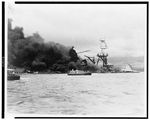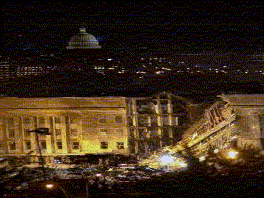Posted on April 15, 2004
Connecting Smoke Rings
James Pinkerton huffs and puffs
by
Daniel Clark
If you really want to worry about our government's competence to respond to terror threats, just remind yourself that James Pinkerton served as a policy analyst during the Reagan and G.H.W. Bush administrations, and then try reading his Newsday column from April 9th.

That piece opens by asking, "If you knew that President Franklin D. Roosevelt had received a memo a month before Pearl Harbor entitled, 'Japanese Determined to Attack the United States in the Pacific,' and that he had done nothing about that information, would that knowledge change your perception of FDR as a wise war leader?" The punch line, as if you didn't see it coming: "Roosevelt received no such memo, of course, but President George W. Bush got a blunt warning five weeks before 9/11 and he did little or nothing."
If that's the kind of analysis that infected our federal bureaucracies during the 80s, it's a wonder we're not all eating borscht by now. The truth is that the FDR administration had been alerted to a possible attack on Pearl Harbor in terms far more blunt than those in the recently declassified Presidential Daily Brief from August 6, 2001.
In 1938, the War Department had warned of the possibility of a Japanese sneak attack, and concluded that "there can be little doubt that the Hawaiian Islands will be the initial scene of action." On January 24, 1941, Frank Knox, the Secretary of the Navy, determined that if the Japanese were to attack, "it is believed easily possible that hostilities would be initiated by a surprise attack upon the Fleet or the Naval Base at Pearl Harbor." Just three days later, the American ambassador to Japan, Joseph C. Grew, sent a cable to the State Department telling of a rumor (one might call it "chatter") that "the Japanese military forces planned to attempt a surprise mass attack on Pearl Harbor using all their military facilities."
By comparison to these, a warning that read, "Japanese Determined to Attack the United States in the Pacific" would have seemed vague to the point of being almost trivial. Likewise, Bush's brief, entitled "Bin Ladin [sic] Determined to Strike in U.S." was hardly the "blunt warning" Pinkerton describes. For starters, the reason Bush received the document was because he demanded it. It was not, as Pinkerton infers, a warning that others tried to bring to the president's attention, which he didn't feel like bothering with. Bush had already assumed that Osama bin Laden wanted to attack targets inside the United States, and ordered an accounting of what was known to date about such efforts.
The title of a written work seldom provides enough information about it to draw a conclusion, as anyone knows who has tried to follow the advice of the book Eat More, Weigh Less, without actually going through the trouble of opening and reading it. Nevertheless, Pinkerton takes the memo's heading itself as a refutation of much of National Security Advisor Condoleezza Rice's testimony before the 9-11 commission.
"Just moments after she had said intelligence was 'not specific as to the time, nor place, nor manner of attack," he writes, "here's a presidential-level document warning, specifically, that al-Qaida's target wasn't overseas somewhere, but rather the United States itself." Gosh, how specific can you get? All the Bush administration had to do was keep an eye on all activity within the United States until further notice, and the plot would have been foiled.
Pinkerton dismisses Rice's attempt to explain the content of the document by charging that she "tried to bury the revelation by piling on words." One paragraph later, he complains that this overly-verbose testimony of hers was not enough, pointing out that "she was under oath, but that doesn't guarantee that every witness will tell the whole truth." There is nothing about Dr. Rice or her testimony before the commission that might lead him to accuse her of breaking her oath, but he must imply that she did in order to explain why her widely viewed appearance at the hearings has failed to yield the anticipated scandal.
After slyly suggesting without evidence that Rice might be guilty of perjury, Pinkerton praises commissioner Bob Kerrey for blurting out classified information on national television. "Kerrey was bound by the same strict rules of classification as [fellow commissioner Richard] Ben-Veniste, but he's a free-spirited war hero and so he didn't care that he was breaking those rules."

If that August 6th memo had contained information anywhere near as significant as Bush's critics were hoping, Kerrey could have been committing a serious breach of national security by free-spiritedly breaking the rules. What's more, the exchange was entirely unnecessary. The commissioners had already been given access to the document, and had interviewed Rice privately for four hours. As far as the stated purpose of the commission is concerned, there was no need to publicly dramatize information they would be factoring into their final report anyway.
Kerrey stated that the memo says "that the FBI indicates patterns of suspicious activity in the United States consistent with hijacking." A convinced Pinkerton adds, "'Hijacking' is pretty darn specific." Is it really?
The actual document, declassified one day after Pinkerton's column appeared, says that those patterns of suspicious activity were "consistent with preparations for hijackings or other types of attacks, including recent surveillance of federal buildings in New York" [emphasis added]. The information is not even specific enough that it can apply only to hijackings, but instead encompasses a far broader, undefined range of terrorist activities. (The "surveillance" of federal buildings was determined by the FBI to be "consistent with tourist activity" after the bureau interviewed the two Yemeni men who had been seen taking pictures.)
The August 6th brief bears out Rice's description of it as "historical information based on old reporting." Its very first line makes the less than startling revelation that, "Clandestine, foreign government, and media reports indicate Bin Ladin since 1997 has wanted to conduct terrorist attacks in the U.S." This is something that had been in the news four years earlier. Had Bush been alarmed by this, it would have called into question whether he had the temperament to serve as Commander-in-Chief. A known terrorist leader who is a sworn enemy of America "wanted" to conduct terrorist attacks in the U.S.? Stop the presses.
Elsewhere, the brief says that bin Laden "may" have been involved in the millennium bombing plot, that al-Qaeda had been recruiting young American Muslims in New York, and that our embassy in the United Arab Emirates had received information about possible bomb attacks inside the U.S. In addition, there is mention of an uncorroborated report that bin Laden was planning a hijacking, in order to free "blind sheik" Omar Abdel Rahman, the 1993 World Trade Center bombing conspirator.
To at least one former policy analyst from the executive branch of the U.S. government, this information should have been taken as a "blunt warning" of the 9-11 attacks. Never mind that the perpetrators were foreign terrorists and not Muslim-American recruits, that their weapons were airplanes and not bombs, and that the Twin Towers were not federal buildings.

Like many of the Bush administration's Democrat foes, the "moderate" Republican analyst seems to be allowing his differences with the president's domestic policies to spill over into criticisms of his handling of national security. Pinkerton actually tries in his column to pin the blame for the terrorist attacks on Bush's opposition to destructive research on human embryos. He complains that Bush obsessed over the issue of embryonic stem cell research in August of 2001 -- as if the President of the United States typically only handles one issue at a time -- and follows by ominously hinting, "And we all know what happened the following month."
Let's return for a moment to Pinkerton's FDR comparison. Undoubtedly, Roosevelt's New Deal programs dominated the first six years of his presidency. During this same time, Hitler became Chancellor of Germany and pulled his country out of the League of Nations, Japan invaded China, Italy invaded Ethiopia, and Germany seized Austria and the Sudetenland. Would it be fair to assume that the president was oblivious or indifferent to these events, just because he'd been emphasizing his domestic initiatives? Of course not. It would be equally nonsensical to conclude that President Bush ignored the possibility of terrorist attacks in the U.S., just because he paid attention to other issues.

The president's critics complain that he failed to connect the dots, but they can't connect them either. This is because the dots they're using are only rings of smoke, which dissipate at the touch of a pencil. Former "terrorism czar" Richard Clarke had destroyed his own credibility long before he spoke to the commission; nevertheless Bush's enemies used Clarke's testimony as a basis to demand that Condoleeza Rice appear to testify on live television, where they hoped she would crumble. Instead, she stood firm, so that when Kerrey and Ben-Veniste swooped in on her, they smashed their beaks and fell away. Ah, but Rice declined to promise the declassification the August 6th brief (which she didn't have the authority to do anyway). Surely this indicated a massive cover-up by the administration. But then, the brief was declassified two days later, and it revealed nothing useful.
It's difficult to say just where the "Bush did nothing" crowd will go from here, but if they take a long look back at where they've been, they'll find that the smoke rings they followed to get to this point have disappeared. They can't see where they've been any better than they can see where they're going. There is, on the other hand, an advantage in marking their path by blowing smoke, in that it is so easy for them to make more.
The Shinbone: The Frontier of the Free Press
Mailbag . Issue Index . Politimals